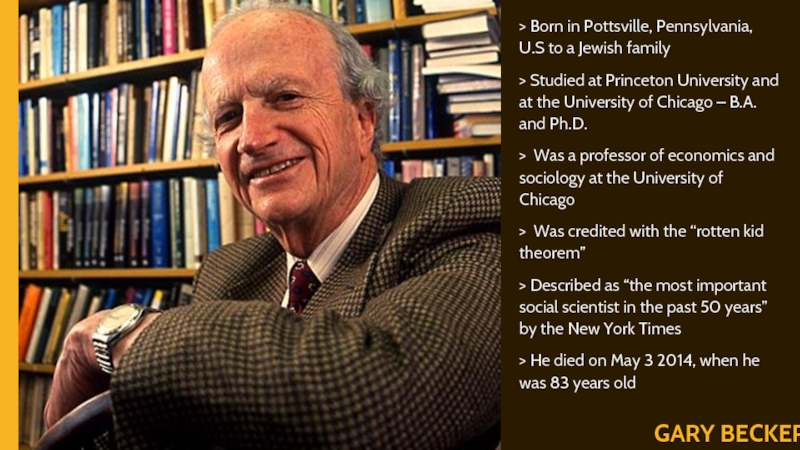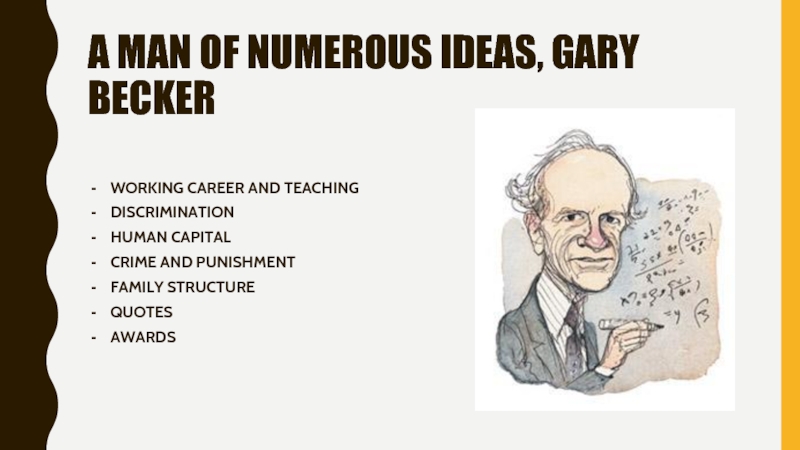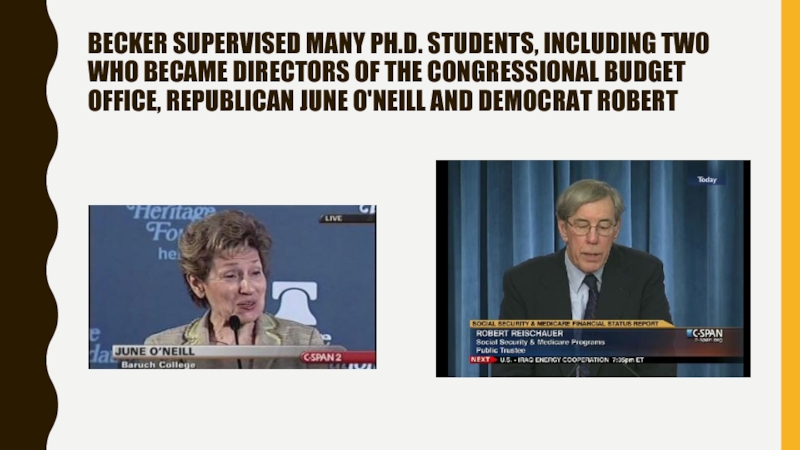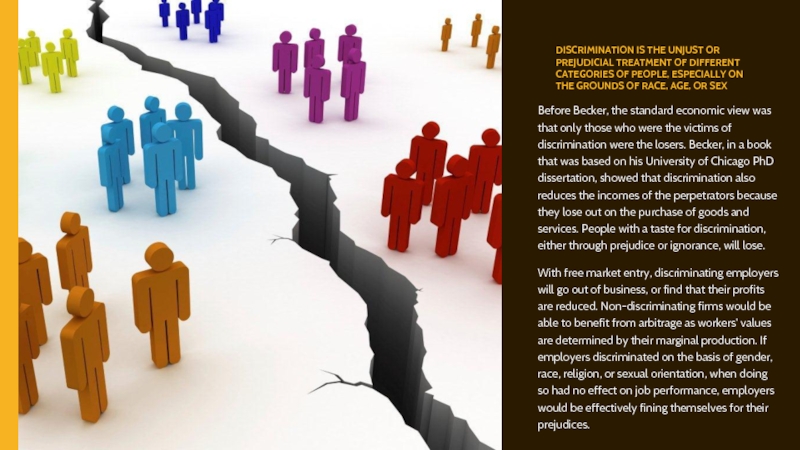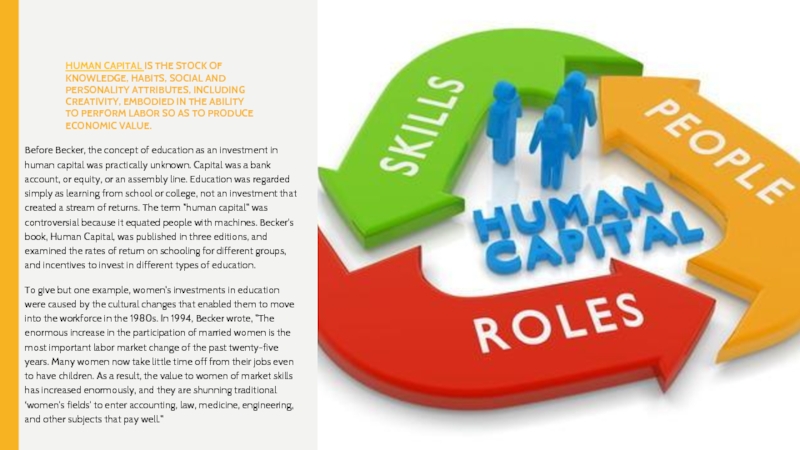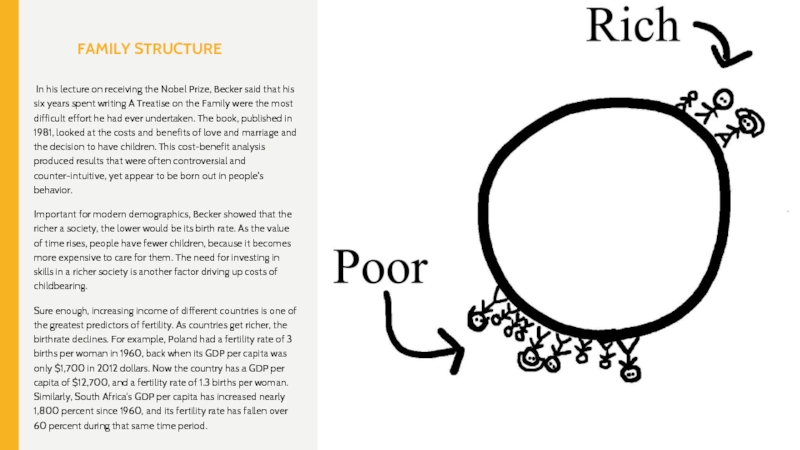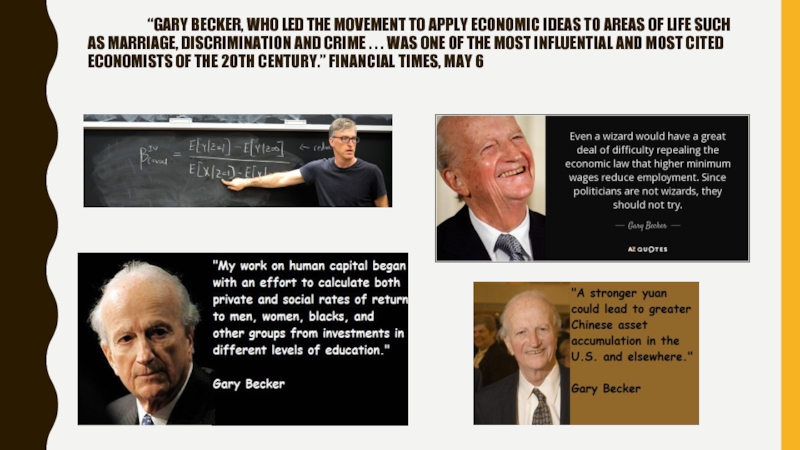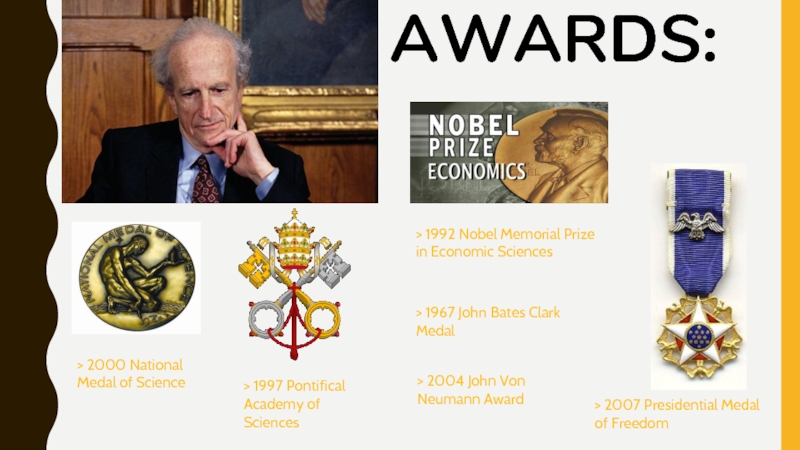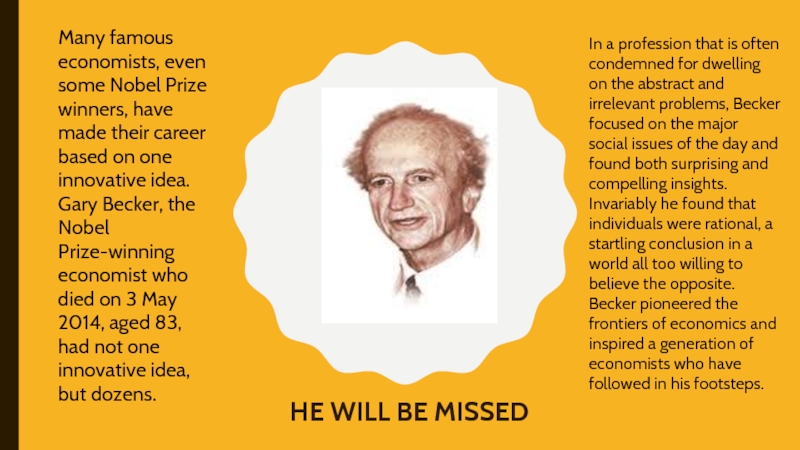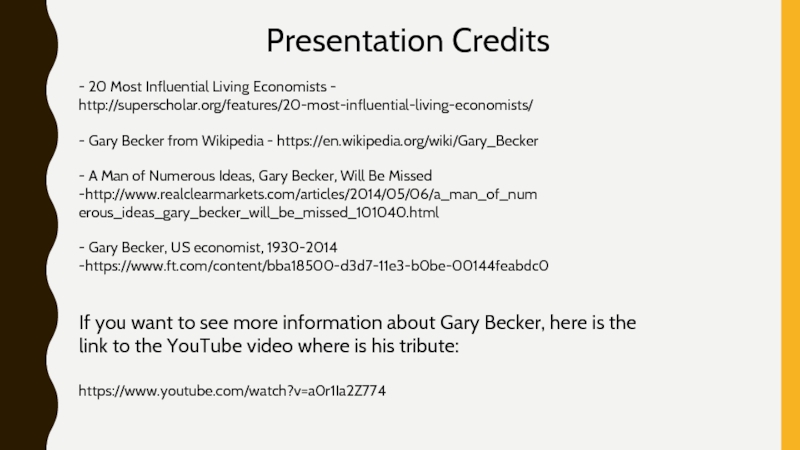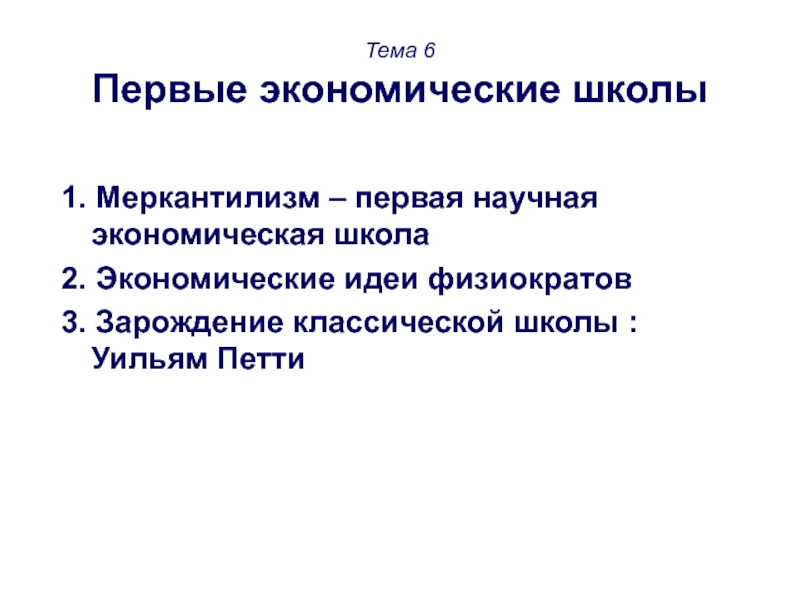- Главная
- Разное
- Дизайн
- Бизнес и предпринимательство
- Аналитика
- Образование
- Развлечения
- Красота и здоровье
- Финансы
- Государство
- Путешествия
- Спорт
- Недвижимость
- Армия
- Графика
- Культурология
- Еда и кулинария
- Лингвистика
- Английский язык
- Астрономия
- Алгебра
- Биология
- География
- Детские презентации
- Информатика
- История
- Литература
- Маркетинг
- Математика
- Медицина
- Менеджмент
- Музыка
- МХК
- Немецкий язык
- ОБЖ
- Обществознание
- Окружающий мир
- Педагогика
- Русский язык
- Технология
- Физика
- Философия
- Химия
- Шаблоны, картинки для презентаций
- Экология
- Экономика
- Юриспруденция
Gary Becker презентация
Содержание
- 1. Gary Becker
- 2. SO WHO IS GARY BECKER? WHAT HAS
- 3. GARY BECKER > Born in Pottsville, Pennsylvania,
- 4. A MAN OF NUMEROUS IDEAS, GARY BECKER
- 5. BECKER SUPERVISED MANY PH.D. STUDENTS, INCLUDING TWO
- 6. DISCRIMINATION IS THE UNJUST OR PREJUDICIAL TREATMENT
- 7. HUMAN CAPITAL IS THE STOCK OF
- 8. CRIME AND PUNISHMENT Before Becker, discussions of
- 9. FAMILY STRUCTURE In his lecture on
- 10. “GARY BECKER, WHO LED THE MOVEMENT TO
- 11. AWARDS: > 2007 Presidential Medal of
- 12. HE WILL BE MISSED In a
- 13. THANK YOU FOR ATTENTION! IF YOU HAVE ADDITIONAL QUESTIONS, PLEASE FEEL FREE TO ASK
- 14. Presentation Credits - 20 Most Influential Living
Слайд 1GARY BECKER
MADE BY ANNA ZUZINA
110-БЭ-АР
The man who merged sociology and economics,
Слайд 2SO WHO IS GARY BECKER?
WHAT HAS HE ACHIEVED IN LIFE TO
Слайд 3GARY BECKER
> Born in Pottsville, Pennsylvania, U.S to a Jewish family
>
> Was a professor of economics and sociology at the University of Chicago
> Was credited with the “rotten kid theorem”
> Described as “the most important social scientist in the past 50 years” by the New York Times
> He died on May 3 2014, when he was 83 years old
Слайд 4A MAN OF NUMEROUS IDEAS, GARY BECKER
WORKING CAREER AND TEACHING
DISCRIMINATION
HUMAN CAPITAL
CRIME
FAMILY STRUCTURE
QUOTES
AWARDS
Слайд 5BECKER SUPERVISED MANY PH.D. STUDENTS, INCLUDING TWO WHO BECAME DIRECTORS OF
Слайд 6DISCRIMINATION IS THE UNJUST OR PREJUDICIAL TREATMENT OF DIFFERENT CATEGORIES OF
Before Becker, the standard economic view was that only those who were the victims of discrimination were the losers. Becker, in a book that was based on his University of Chicago PhD dissertation, showed that discrimination also reduces the incomes of the perpetrators because they lose out on the purchase of goods and services. People with a taste for discrimination, either through prejudice or ignorance, will lose.
With free market entry, discriminating employers will go out of business, or find that their profits are reduced. Non-discriminating firms would be able to benefit from arbitrage as workers' values are determined by their marginal production. If employers discriminated on the basis of gender, race, religion, or sexual orientation, when doing so had no effect on job performance, employers would be effectively fining themselves for their prejudices.
Слайд 7 HUMAN CAPITAL IS THE STOCK OF KNOWLEDGE, HABITS, SOCIAL AND PERSONALITY
Before Becker, the concept of education as an investment in human capital was practically unknown. Capital was a bank account, or equity, or an assembly line. Education was regarded simply as learning from school or college, not an investment that created a stream of returns. The term "human capital" was controversial because it equated people with machines. Becker's book, Human Capital, was published in three editions, and examined the rates of return on schooling for different groups, and incentives to invest in different types of education.
To give but one example, women's investments in education were caused by the cultural changes that enabled them to move into the workforce in the 1980s. In 1994, Becker wrote, "The enormous increase in the participation of married women is the most important labor market change of the past twenty-five years. Many women now take little time off from their jobs even to have children. As a result, the value to women of market skills has increased enormously, and they are shunning traditional ‘women's fields' to enter accounting, law, medicine, engineering, and other subjects that pay well."
Слайд 8CRIME AND PUNISHMENT
Before Becker, discussions of crime centered on possible mental
Social policy can change these variables. It sounds obvious now that making it more likely that criminals will be caught, or making it easier for criminals to find legal jobs, can reduce crime, but no one had analyzed the variables in an economic framework before. This helped Harvard University professor James Q. Wilson to develop his "broken windows" theory, which suggested that aggressive policing would reduce crime.
Слайд 9FAMILY STRUCTURE
In his lecture on receiving the Nobel Prize, Becker
Important for modern demographics, Becker showed that the richer a society, the lower would be its birth rate. As the value of time rises, people have fewer children, because it becomes more expensive to care for them. The need for investing in skills in a richer society is another factor driving up costs of childbearing.
Sure enough, increasing income of different countries is one of the greatest predictors of fertility. As countries get richer, the birthrate declines. For example, Poland had a fertility rate of 3 births per woman in 1960, back when its GDP per capita was only $1,700 in 2012 dollars. Now the country has a GDP per capita of $12,700, and a fertility rate of 1.3 births per woman. Similarly, South Africa's GDP per capita has increased nearly 1,800 percent since 1960, and its fertility rate has fallen over 60 percent during that same time period.
Слайд 10 “GARY BECKER, WHO LED THE MOVEMENT TO APPLY ECONOMIC IDEAS TO
Слайд 11AWARDS:
> 2007 Presidential Medal of Freedom
> 1992 Nobel Memorial Prize
> 2000 National Medal of Science
> 1997 Pontifical Academy of Sciences
> 1967 John Bates Clark Medal
> 2004 John Von Neumann Award
Слайд 12
HE WILL BE MISSED
In a profession that is often condemned for
Many famous economists, even some Nobel Prize winners, have made their career based on one innovative idea. Gary Becker, the Nobel Prize-winning economist who died on 3 May 2014, aged 83, had not one innovative idea, but dozens.
Слайд 14Presentation Credits
- 20 Most Influential Living Economists - http://superscholar.org/features/20-most-influential-living-economists/
- Gary Becker
- A Man of Numerous Ideas, Gary Becker, Will Be Missed -http://www.realclearmarkets.com/articles/2014/05/06/a_man_of_numerous_ideas_gary_becker_will_be_missed_101040.html
- Gary Becker, US economist, 1930-2014 -https://www.ft.com/content/bba18500-d3d7-11e3-b0be-00144feabdc0
If you want to see more information about Gary Becker, here is the link to the YouTube video where is his tribute:
https://www.youtube.com/watch?v=a0r1Ia2Z774


